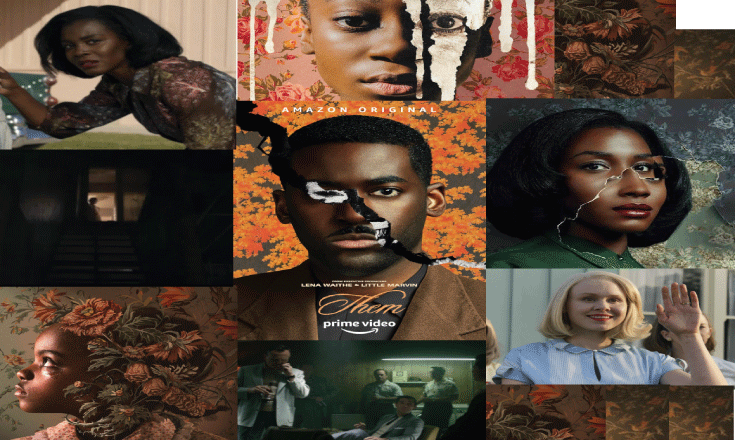The premier season of THEM, from creator Little Marvin, was released on 4/9/2021 to the Amazon Prime streaming service. This first season is intended to be the beginning of an anthology series, in a similar vein to The Haunting and American Horror Story franchises. The ten episode season follows the story of the Emory’s, a Black family who moves from North Carolina to the previously all-White neighborhood of East Compton during The Great Migration and their first ten days in their new home.
I am going to say first that although I binge watched this series, I don’t recommend that to anyone else. It’s… a lot. I always read other reviews before I write my own, and a lot of people have criticized the show for it’s very explicit and utterly brutal portrayal of both overt and passive racism, but also because unpacking the complexity of the characters, the overall story and the portrayals of racism are too much for some viewers. I did not find that to be the case, but I am also not a Black American nor is this new information to me; I found the treatment of both race and gender to be historically accurate and I didn’t feel it took away from the story.
I thought the creators did a really great job of showing how sexism and patriarchy sit alongside racism and white supremacy. I thought the way the writers interwove a story about redlining and the supernatural was impressive. None of that is to say that the portrayals of racism are not extremely brutal and hard to watch; there is not a trigger warning large enough for Episode 5. Part of why I recommend watching this series in pieces instead of one sitting is to allow for time to sit with and reflect on that complex intensity.
That multilayered, rich storytelling also transcends to the characters within the story; they are nuanced, each haunted by trauma, and every member of the Emory family, as well as bigoted, spiteful neighbor Betty, could have an entire movie dedicated to their backstory. However, I think the tension I felt while watching the first season began with the understanding that these were characters too complex to fully expand upon in ten episodes, and that there were parts of their backstories that would be left for my own mind to fill in.
Deborah Ayorinde and Alison Pill both truly excelled as female lead characters, and as an ensemble the entire cast really shone. The Emory family, along with other Black characters, do a truly amazing job of demonstrating the exhaustion they face simply going through their days. Ashley Thomas, in the role of Henry Emory, has taken a job as the only Black engineer at his company, something he is reminded of constantly. Shahadi Wright Joseph portrays Ruby Emory, a teenage girl attempting to adjust to being the only Black student at her school and Melody Hurd as the youngest Emory daughter is equal parts adorable and uncanny.
The writing is consistent and solid, although I definitely thought the first half was much stronger than the final conclusion. Again, a lot of the pushback from other reviewers regarding the finale seems rooted in the fact that the racial tension is never resolved – but I think that misses the point; racism in America doesn’t just go away for the convenience of a happy ending.
However, I do think that in trying to pack so much nuance into the characters and larger themes, there were some missteps in the effort to resolve the supernatural elements of the story; that’s where I think the creators took on too much and couldn’t fully develop all of their concepts. There were some loose ends and a failure to connect earlier information within the final showdown with the horror-specific storytelling elements. I did think the finale did a great job of demonstrating how the “us and them” dichotomy starts to turn inward; the external threat eventually setting in-groups against each other.
I think saying I “enjoyed” this series is maybe the wrong word; I appreciated it, and I hope that we see additional installments in this anthology. The visuals and use of the supernatural was very similar to Lovecraft Country, but also reminded me a lot of American Horror Story; the filming style was reminiscent of Hotel and the pacing reminded me of Roanoke. Like American Horror Story, the imagery and themes invoked pretty much cover the entire spectrum of horror tropes.
The soundtrack, a blend of classic rock ‘n’ roll, jazz and soul, was extremely effective in both creating, and disrupting, mood. Brutality aside, the settings are beautiful, in a way that allows for them to become incredibly ugly as more and more aspects of both the human and supernatural dangers facing the Emorys are exposed. The episodes run 35-50 minutes, but some of the scenes feel like they take hours.
As I have written about before, my love of film is shared by my mother who gave me a fantastic introduction to horror and for a long time the horror genre has been a place of escapism; a space to view a world different from our own where we come away feeling release and, even if it gives us nightmares or scares us, allows us to feel safe. The most recent wave of horror media is clearly splitting with the idea that the fear ends when the credits roll. For all of the generally effective jump scares and creepy, supernatural imagery, I didn’t come away from this feeling comforted.
I find myself thinking about the show, days later, and dreaming about it, and there is something to be said for the kind of writing that hooks into me like that. I respect that this is not going to be a show for everyone. For some, the historical content is going to be too much; for others, the heavy handed use of horror tropes, especially towards the end, are going to feel like clumsy story telling; identifying our cinematic boundaries is important, and this show pushed mine. I think that this particular diversion away from traditional horror into a more real life exposure of the real dangers in our world is an important one, and speaks to how our cultural storytelling traditions are changing.
This isn’t just a story about “them”, it’s about all of us; it’s about how we face our own demons, on our own terms, and that reckoning does not diminish the terror of the real world.
Author

Morgan is a Seattle Central alumni currently attending Oregon State University where she is majoring in Anthropology. In addition to writing, she enjoys painting and linguistics. She lives in a very small house with a very fat cat.












Be First to Comment